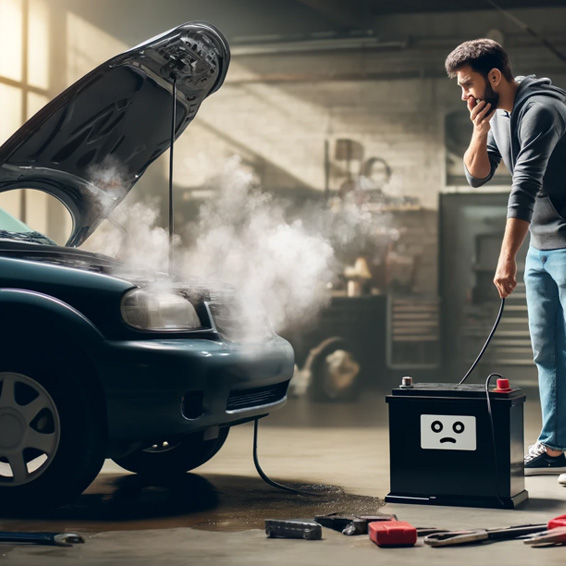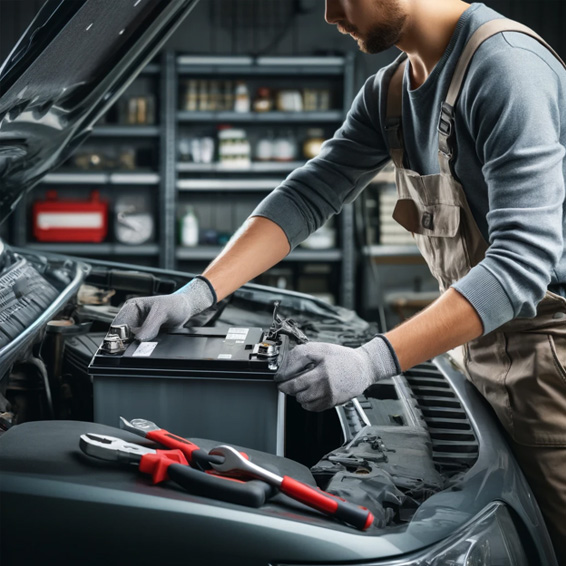If you’ve ever caught a whiff of rotten eggs in your car, it’s likely due to hydrogen sulfide (H₂S). This colorless gas, known for its distinct rotten egg odor, can be generated by malfunctioning components in your vehicle, especially the battery.
Common causes car smells like rotten eggs
Several culprits could be behind that foul smell in your car, such as:
- Battery issues
- Catalytic converter problems
- Fuel system troubles
car smells like rotten eggs Battery
Sulfuric Acid and Hydrogen Sulfide

Car batteries, particularly lead-acid ones, contain sulfuric acid. Normally stable, this acid can sometimes decompose, releasing hydrogen sulfide gas.
Overcharging the Battery
Overcharging is a frequent cause of hydrogen sulfide emissions from car batteries. It can occur due to a faulty alternator or an incorrect voltage regulator, leading to excessive charging. This overheating can break down sulfuric acid, producing hydrogen sulfide.
Battery Leakage
Old or damaged batteries can leak, causing a rotten egg smell. Cracks or corrosion in the battery casing allow sulfuric acid to escape, creating a hazardous environment and reacting with other components to produce hydrogen sulfide gas.
Dangers Associated with Battery Odors
Hydrogen sulfide in your vehicle isn’t just unpleasant; it’s dangerous:
- Health Risks: Toxic when inhaled, it can cause respiratory problems, eye irritation, and, in high concentrations, be fatal.
- Corrosion: Leaked acid can corrode engine parts and the car’s electrical systems, leading to costly repairs.
- Fire Hazard: Hydrogen sulfide is flammable. Its accumulation can lead to fires or explosions, especially in confined spaces like an engine compartment.
Other Potential Sources of the Smell
While the battery is often the main suspect, other problems can also create a rotten egg smell:
- Catalytic converter issues: A failing catalytic converter can produce sulfur smells.
- Fuel pressure sensor problems: Incorrect fuel pressure can cause the engine to run poorly.
- Old transmission fluid: Degraded transmission fluid can emit a foul odor.
Diagnosing the Issue
Visual Inspection
Start by visually inspecting the battery. Look for:
- Corrosion: White or blue-tinged corrosion around battery terminals.
- Cracks or Bulging: Any signs of damage or deformation in the battery casing.
- Leakage: Liquid around the battery could indicate sulfuric acid leakage.
Using Diagnostic Tools
Use a multimeter to check the battery’s voltage for a thorough diagnosis. A fully charged battery should read around 12.6 volts when the engine is off. A significantly higher reading could indicate overcharging.
Solutions and Preventative Measures
Replacing the Battery

If your battery is leaking or damaged, replacing it is the safest option. Choose a high-quality battery from a reputable manufacturer for longevity and reliability.
Regular Maintenance
- Check Battery Terminals: Regularly clean them to prevent corrosion.
- Monitor Charging System: Ensure the alternator and voltage regulator work correctly to avoid overcharging.
- Inspect Battery Casing: Regularly check for signs of wear and tear.
When to Seek Professional Help
Some battery issues require professional attention. If you notice persistent smells or significant corrosion or are unsure about handling battery components, consult a professional mechanic for a comprehensive diagnostic and appropriate actions.
Impact on Car Performance
Ignoring a rotten egg smell can do more than offend your nose—it can harm your car’s performance and lead to pricier repairs.
Cost Implications
The cost of replacing a battery or fixing other related issues can vary. Tackling the problem can save you money in the long run.
Conclusion
A rotten egg smell in your car often indicates battery issues related to sulfuric acid and hydrogen sulfide. Overcharging and leakage are common causes, posing health and safety risks. Regular maintenance and timely battery replacement can prevent these problems. When in doubt, seek professional help to ensure your vehicle remains safe and functional.
By understanding the causes and solutions for battery-related odors, you can keep your car in top condition and avoid hazards associated with hydrogen sulfide emissions. Regular checks and maintenance not only extend the life of your car battery but also ensure a safer driving experience.
FAQs
What should I do if I smell rotten eggs in my car?
Start by checking the battery and other potential sources like the catalytic converter and fuel system.
How can I tell if my car battery is failing?
Look for symptoms like a slow engine crank, swollen battery case, and low battery fluid levels.
Can a rotten egg smell harm my health?
Yes, inhaling hydrogen sulfide gas can be harmful. Ventilate your car and address the issue immediately.
How often should I replace my car battery?
Typically, it happens every 3-5 years, it can vary based on driving conditions and maintenance.
Is it safe to drive my car if it smells like rotten eggs?
No, it’s best to address the issue immediately, as it can indicate serious problems.

